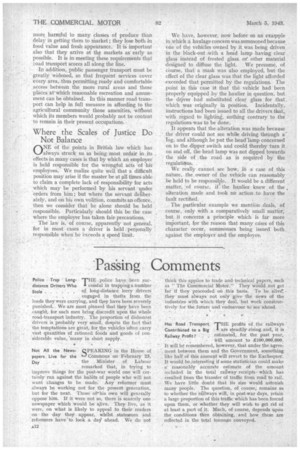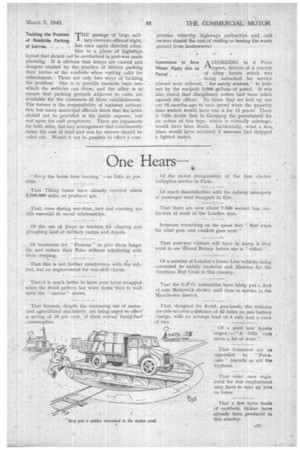'Pas . sing Comments
Page 14

Page 15

If you've noticed an error in this article please click here to report it so we can fix it.
Police Trap LongTHE police have been sue distance Drivers Drivers Who cessful in trapping a number
Stole . . . of long-distance, lorry drivers engaged in thefts from the loads they were carrying, and they have been severely punished. We are most pleased that they have beep
• .caught, for such men bring discredit upon the whole road-transport industry. The proportion of dishonest 'drivers is probably very small, despite the fact that
, the temptations are great, for the vehicles often carry .vast quantities 'of rationed foods and goods of considerable value, 'many, in short supply.
Not All the NewsQPEAKING in the House of papers Live for the h.-) COmmons on February 23,
the Minister of Labour
remarked that, in trying to improve things for the post-war world one will certainly run against the habits of people who will not want changes to be made. Any reformer must always be working not for the present generation, but for the next. Those' of•his own. will generally oppose him.. If it were not so, there is scarcely one . newspaper which 'would be alive. They live, as it were, on what is likely to appeal to their readers . on the day they appear, whilst statesmen and reformers have 'to look .a day' ahead. We do not
think this applies to trade and-technical papers, such as " The commercial Motor." They would not get far if they proceeded on this basis. To be alive", they must always not only give the news of the industries with which they deal, but work constructively for the future and endeavour to see 'ahead.
Has Road Transport THE profits of the railways contributed to a Big _ are steadily .rising and, it is Railway Profit? .• estilnata for the past year,
will amount to £100,000,000. It will bC remembered, however, that under the agreement between them and the Government, something like half of this amount will revert to the Exchequer. It would be interesting if some statistician could make
reaSonabiy accurate estimate of the amount included in the total railway receipts, which has resulted from the transfer of traffic from road to rail. We have little doubt that its size would astonish many people. The question, of course, remains as to whether the rallways will, in post-war days, retain a large proportion of this traffic which has been forced upon them, or whether they will wish to get rid of at least a part of it. Much, of course, depends upon the conditions then obtaining, and how these are reflected in the total tonnage conveyed.
Tackling the Problem of Roadside Parking of Lorries.
THE passage of largo mili
Tackling the Problem of Roadside Parking of Lorries.
tary convoys, often at night, has once again directed attention to a phase of highvfays layout that should not be overlooked in post-war roads plannifig. It is obvious that delays are caused and dangers created by the practice of drivers parking their lorries at the roadside when visiting cafés for refreshment. There are only two ways of tackling the problem. One is to provide roadside bays into which the trehicles can draw-, and the other is to ensure that parking grounds adjacent to cafés are available for the customers dl those establishments. The former is the responsibility of highway authorities, but many municipal officials think that the latter should not be provided at the public expense, but rest upon the café proprietors. There are arguments for both sides, but any arrangement that considerably raises the cost of food and rest for drivers should be ruled out. Would it not be possible to effect a com
promise whereby highways authorities and café owners shared the cost of renting or leasing the waste ground from landowners?
Injunctions to Save A CCORDING to a Press Water Apply also to rAreport, drivers of a convoy Petrol of army lorries which was
being embarked for service abroad were ordered, for safety reasons," to jettison by the roadside 3,000 gallons of petrol. It was also stated that disciplinary action had been taken against the officer. To think that we laid. up our car'18 months ago to save petrol when the quantity thus wasted would have run it for 12 years! There is little doubt that in Germany the punishment for an action of this type, which is virtually sabotage, would have been death. Incidentally, what a fine, blaze would have occurred if someone had dropped a lighted match.




















































